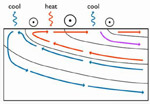Dynamics of the Antarctic Circumpolar Current
Building on my early contributions to the theory of ocean gyres and the thermocline – [6], [9] – I have been attracted to the southern ocean and particularly the dynamics of the ACC. The ACC is in a distinctly different dynamical regime from that of ocean gyres. Because of the absence of meridional boundaries, it is not in Sverdrup balance. Instead, one must fundamentally invoke eddy processes. In [66], [67], [68], [70], culminating in [74], [98] and [108], we presented a simple theory that connects the zonal flow, (residual) meridional overturning circulation and stratification, showing how they are intimately connected to one another. These solutions were the first to capture the essence of what I believe to be the dynamical balances at work in the upper cell of the ACC. Eddies play a fundamental role in setting the stratification and the sense and vigor of the overturning circulation [66], [67], [68] & [70]. This body of work is providing the modern paradigm for thinking about the dynamics of the ACC. It is reviewed in [133], along with the important role that the Southern Ocean plays in climate.



